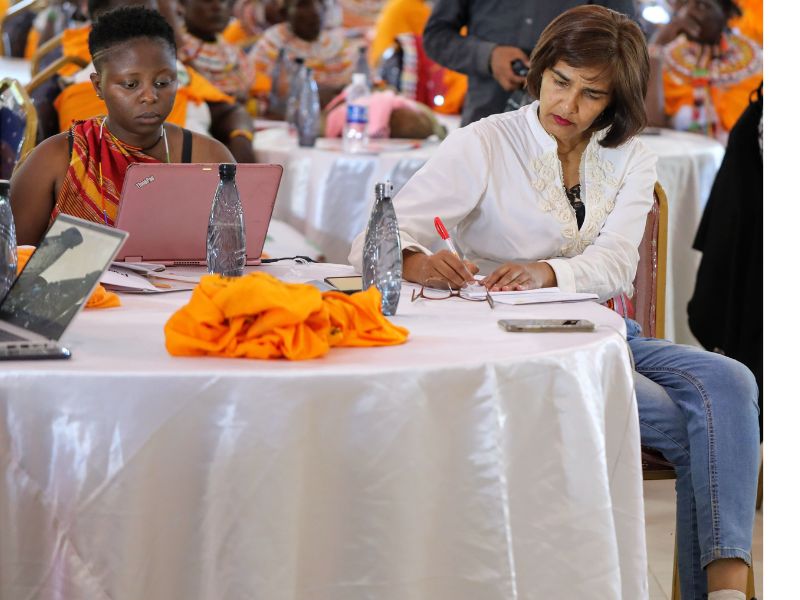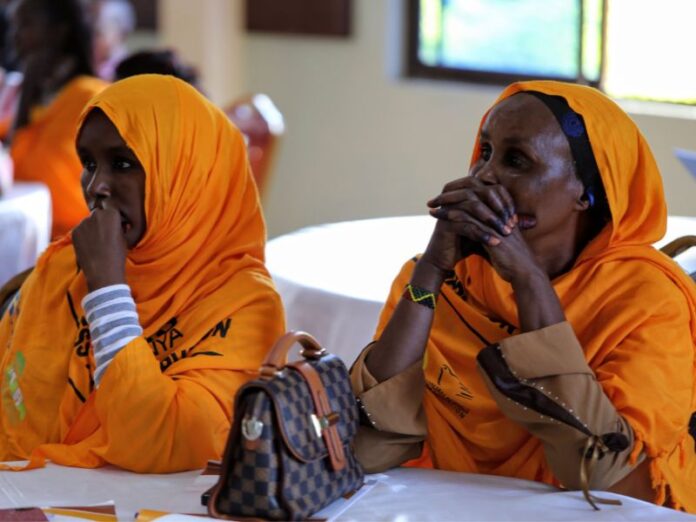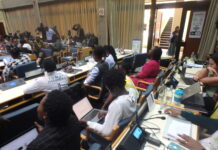By Lenah Bosibori
Isiolo County, Kenya: NRT Trading BeadWORKS Kenya recently held a Women in Business and Conservation Conference in Isiolo County. The conference brought together 120 women leaders and entrepreneurs from Northern Rangelands Trust (NRT) member Community Conservancies to discuss the opportunities and challenges of building resilient, sustainable businesses that can contribute to climate action and promote gender equality.
Gender, climate change, and conflict are interconnected and significantly impact the lives of individuals, communities, and particularly women. The people living in the northern parts of Kenya are the most vulnerable, and the current frequent droughts heighten existing gender inequalities and resource-based conflicts that adversely affect women and children.
However, evidence shows that women’s empowerment and advancing gender equality can lead to more environmentally friendly household, community, and national decision-making, contributing to resilience and climate change adaptation.
The Women in Business and Conservation Conference participants shared their experiences, best practices, and innovative ideas to empower women to take leadership roles in climate action and development. Dade Duba from Biliqo Bulesa Conservancy shared her story of resilience and determination to start and manage a business despite societal challenges. She said, “I wanted to go to school, but unfortunately, I was married off at an early age, and this dream was never realized. All the same, my desire to start and manage a business was still intact. I started several businesses that failed; I never gave up, and now I am a successful businesswoman and a leader in my community. I own a posho mill that my children and I have operated for years.”

The conference aimed to provide a platform for women leaders to discuss and share their experiences, best practices, and innovative approaches to building resilient businesses and communities in the face of climate change. It also aimed to increase awareness and understanding of the impacts of climate change on businesses and communities, particularly those that affect women directly.
The conference also identified and discussed policy and regulatory frameworks that support gender equality, climate action, and sustainable economic growth. Additionally, the conference provided an opportunity to discuss other social issues affecting women and girls at community and household levels, such as well-being and reproductive health, girl-boy child education, early marriages, and gender-based violence.
Beatrice Lempaira, Gender and Social Inclusion Director at Northern Rangelands Trust said, “This conference involves women from four Counties, Laikipia, Samburu, Marsabit, and Isiolo. This is a conference for our women in business and conservation. We bring these business leaders together to share their experiences and mentor each other to deeply discuss our opportunities and challenges in this landscape.”
NRT Trading is committed to conserving natural resources and wildlife through self-governed, community-owned conservancies and sustainable, social, and ethical enterprises by promoting peaceful community partnerships. The organization empowers local communities to achieve a productive, self-reliant future through enterprise. It develops, pilots, and runs enterprises that bring women and youth to the ‘table’ of discussion, giving them the agency to determine their futures through business and skills development.
The Women in Business and Conservation Conference provided a robust platform for women leaders and entrepreneurs to discuss and explore the opportunities and challenges of building resilient, sustainable businesses in the face of climate change.
Through their innovative ideas, best practices, and shared experiences, the participants identified policies and frameworks supporting gender equality, climate action, and sustainable economic growth. NRT Trading’s commitment to conserving natural resources and wildlife by promoting peaceful community partnerships is crucial for building resilient, sustainable communities in the face of climate change.














